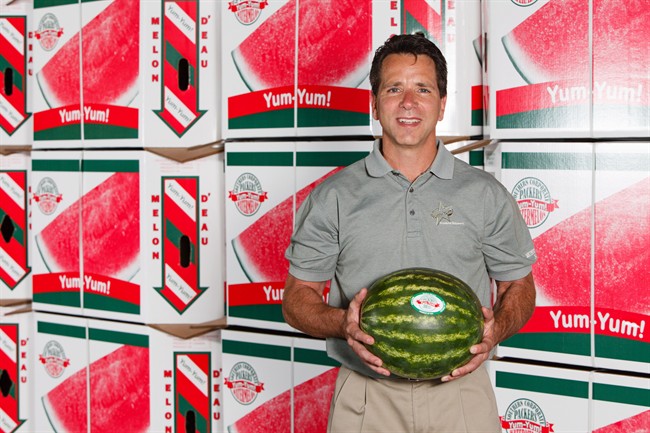TORONTO – When watermelons aren’t in season, consumers in this country can still buy “Canadian” melons, thanks to an Ontario man who has set up shop in Florida.

Brian Arrigo started his own company in the southern U.S. state when he realized Canadians were missing out on local sweet juicy melons because of the short growing season in the northern climate.
Arrigo, who cut his chops in the family wholesale business at the Ontario Food Terminal in Toronto, seized the opportunity 25 years ago to fill in the large gap in watermelon availability in this country by shipping melons to supplement the crop grown in southwestern Ontario, which generally is not available until late summer.
He relocated, started his company, Southern Corporate Packers, and began shipping watermelons to Canada under the Yum-Yum brand.
“I am living in the States, but I am Canadian and the biggest percentage of what we farm goes to Canada to the Canadian market,” he said in an interview from his base in Immokalee, Fla., northeast of Naples, an area in which agriculture is the dominant industry.
Technological improvements meant that “we were able to start growing more watermelons and for longer periods of time than in the summertime up there, so now we are able to have continuous watermelons year-round.”
In fact, Arrigo doesn’t have an off-season. From November through March, he imports watermelons from Mexico and Central America to send to Canada until the fruit is ready in Florida. During the winter months, his growers produce broccoli, corn, cucumbers, eggplant, peppers, squash, tomatoes and more.
“I planned it strategically because of our slow time with the watermelons,” he explained.
Then, starting sometime in March, Arrigo, 48, makes the circuit from Florida to Georgia, then Delaware and southwestern Ontario, following the ripening of the melons grown on some 4,000 hectares to supervise the shipping.
Upon harvest, the watermelons are packed and shipped to his facility in Kitchener, Ont., where the product is checked again before being distributed to the Canadian market. (Watermelons from Mexico go through Texas for initial quality control, then are shipped to the Kitchener facility. The watermelon from Central America come in via Florida.)
His wife Julia takes their two daughters, age five and 13, back to Kitchener to run that operation during the summer. “When school is finished, she’ll leave from here and go up and run the warehouse, actually on the floor, packing the watermelons, checking the quality of the product and she’ll work, I swear to you, 20 hours a day,” he said.
Improvements in crop science and shipping over the years have meant better-quality fruit year-round for consumers.
“Years ago if it wasn’t spring or summertime watermelons never tasted very good. Now we’re able to get better-quality fruit, better varieties and do a better job,” said Arrigo, who is a member of the National Watermelon Promotion Board, based in Orlando, Fla., and head of the research committee, which undertakes projects to reduce diseases in the fields and ultimately improve the volume and quality of watermelons.
That is good news for those who love to bite into a wedge of refreshing watermelon at a family barbecue or summer picnic when the temperature is soaring or enjoy it in a fruit salad during the winter months.
There is definitely a reason for the name given to watermelon – the fruit is 92 per cent water. The flesh packs a healthy punch, with an antioxidant known as lycopene which gives it its deep pink colour, as well as vitamins A and C and potassium. Plus it’s low in calories – a 500-millilitre (two-cup) serving contains about 80 calories – and has no fat, sodium or cholesterol.
A diet containing foods high in potassium and low in sodium may reduce the chance of high blood pressure, a risk factor for stroke and heart disease.
Watermelon and watermelon rind are an excellent source of the amino acid citrulline, which supports exercise muscle recovery and the elimination of ammonia.



Comments